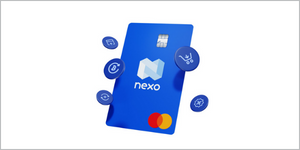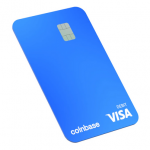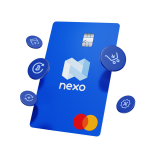
Best Overall Crypto Debit Card
Coinbase: great for customers who need a user-friendly option backed by the leading U.S. crypto exchange.
Read our review
Top Crypto Debit Card for Rewards
Uphold: Rewards paid in GBP rather than a proprietary token make Uphold the best rewards debit card.
Read our review
Top Crypto Debit Card for Low Fees
Nexo: the Nexo Card gives users access to a crypto lending ecosystem that provides cash-back benefits with no annual fees
Read our reviewCrypto Debit Cards: How They Work
A crypto debit card lets you load up your crypto on a traditional debit card and spend it anywhere.
Unlike a crypto credit card, you are spending crypto that you already own. And unlike a regular debit card, you’re spending cryptocurrency, which is converted into dollars at the time of the transaction (which is a taxable event).
In this guide, we’ll explain crypto debit cards from the perspective of intelligent crypto investors.
Key Takeaways
- Crypto debit cards let you spend your valuable crypto (like selling gold to pay for dinner).
- Every time you use them, you trigger a taxable event (which is up to you to calculate).
- Beware of cards that convert your crypto to their own mystery token.
- Crypto debit cards also have additional fees.
- If you must use a crypto debit card, look for low fees, tax reporting, and integration with a crypto account (like Coinbase).
Crypto Investor Warnings
1. Crypto Debit Cards Spend Your Investments. Would you sell a piece of gold jewelry to pay for a dinner out? That’s essentially what you’re doing with crypto debit cards: spending a valuable investment that could be worth much more in the future.
Even worse, your crypto could go up in value just after you spend it, giving you a case of spender’s remorse. Our approach is to HODL, not sell.
2. Crypto Debit Cards are Taxable. Crypto debit cards are not like regular debit cards: every time you sell your crypto, you trigger a taxable event, meaning you have to pay taxes on any increase between when you bought it and when you spent it.
Some card issuers will send you the 1099s that you’ll need to calculate your taxes, but they won’t necessarily know when you bought the crypto. That’s up to you. This makes spending with crypto debit cards much trickier than regular debit cards.
3. Crypto Debit Cards May Convert Your Crypto
Some crypto debit cards convert your crypto into their own mystery token when you load the card. (Let’s call it MysteryCoin.)
This means you’re not holding cash on that card, but MysteryCoin, which may go up or down in value. You’re at the mercy of MysteryCoin’s price.
You’ll also trigger another taxable event when you spend MysteryCoin, so you have to pay taxes on selling your original crypto for MysteryCoin (when you load the card), and more taxes when you sell MysteryCoin (when you spend from the card).
Are Crypto Debit Cards Worth It?
At Bitcoin Market Journal, we believe in intelligent crypto investing: each month, we buy and hold quality crypto assets, as part of a diversified investment portfolio, and hold onto them over the long term (5+ years).
Over time, this approach has blown away the returns of traditional investors (see our latest results here).
There’s nothing wrong with traditional debit cards, which can help you control your spending. But crypto debit cards are like selling your gold to pay for dinner.
Our Rating Criteria
Now that you’ve read our warnings above, we’ve rated and reviewed the best crypto debit cards that offer:
- Low fees
- Tax reporting
- Integration with a crypto account (so you don’t convert your crypto until you spend it).
 Crypto Debit Cards: Our Top Picks
Crypto Debit Cards: Our Top Picks
Coinbase
Brian Armstrong and Fred Ehrsam founded Coinbase on June 1, 2012, and since then, it’s grown to become one of the world’s largest and most respected crypto companies. (See our piece on How to Invest in Coinbase.)
The company’s crypto debit card allows cardholders to spend cryptocurrencies like bitcoin (BTC) and Ethereum (ETH) anywhere Visa debit cards are accepted at 40M+ merchants worldwide.
The card highlights no fees for transactions or annual memberships. A simple rewards-earning structure is capped only by spending limits, and users can check their monthly allotment on the Coinbase App.
What makes the card especially appealing is that it is tied to one of the largest crypto exchanges in the world. The debit card links to your Coinbase account; all withdrawals come from there.
To get started, you just need to open a Coinbase account or download the app, load it up with crypto, and then request a debit card.
Pros:
- World-class security from a trusted crypto exchange.
- Contactless payments.
- Rewards and cashback.
- 250 crypto assets supported.
- No annual fees.
Cons:
- Unless you are using USDC, a 2.49% fee is charged to convert your crypto into dollars.
- Users need a Coinbase account.
- KYC required.
Conclusion: The Coinbase debit card is good for customers who need a user-friendly option backed by the leading U.S. crypto exchange.
Wirex Debit Card
Wirex is a UK-based company offering crypto debit cards for personal and business use. The company provides you with a contactless card and an app to manage it.
Wirex’s main product, the Wirex Visa card, allows you to convert between fiat currencies and cryptocurrency and use either at locations accepting contactless payments.
The card provides generous rewards, and many consider it among the best for consumer perks, like Wirex X-tras, which gives up to 8% crypto cashback in the form of WXT tokens, a 12% savings bonus on the balance of your WXT account, and access to exclusive merchant offers.
The Wirex debit card has additional benefits, including a wide range of cryptocurrencies and free or low fees, like free ATM withdrawals up to $200 per month, then 2% after that.
Wirex also offers the X-Tras program, a subscription service starting at €9.99 that offers bonuses for participants that include increased rewards (starting at 3%), savings bonuses, and interest-earning accounts.
Pros:
- No monthly maintenance fees.
- Cashback rewards.
- 41 crypto assets supported.
- Widely available globally.
- Easy to use.
- Free ATM withdrawals up to $200 per month.
Cons:
- Rewards only come through the X-Tras program, which could outweigh the benefits.
- Limited availability, primarily in Europe and the Asia Pacific regions.
- You need Wirex tokens, the company’s in-house crypto asset, to get the best rewards.
Conclusion: The Wirex debit card is good for customers who want a low-fee card and easy access to a wide range of currencies and fiat — if available in your country.
Nexo Debit Card
The Nexo Card is provided by Nexo, a crypto lending service that has grown into a large ecosystem that comprises exchange operations and a proprietary wallet and card. You can manage the card conveniently from the Nexo Wallet App.
Unlike other debit cards, there is no need to load the Nexo card. Instead, it uses a line of credit linked to your held cryptocurrencies. You can opt for APR repayments as low as 0% or increase your line of credit with rates as high as 13.9%. The line of credit functionality means that, unlike credit cards, there are no minimum monthly payments.
Nexo users can pay with the Visa-based card at over 40 million merchants worldwide. In addition, it supports up to 20 cryptocurrencies, including bitcoin, Ethereum, and NEXO (the platform’s native token).
With the card, Nexo provides a €10,000 limit for foreign transaction fees and five free ATM withdrawals of up to €10,000 each month. Additional withdrawals are charged €1.99 per transaction.
The great thing about the card is that it has no annual or inactivity fees. Interest rates on debit card mode reach 14% interest with NEXO tokens. You have to download the app and order the card to get started. Make sure to have Apple Pay or Google Pay ready to settle your outstanding totals quickly.
Pros:
- There is no annual or inactivity fees.
- Rewards and interest are generous, as are the ATM and international transaction limits.
- 14% daily compound interest with NEXO tokens.
Cons:
- Limited to the users on the Nexo system.
- Only available to residents of the European Economic Area (EEA).
Conclusion: For European consumers, the Nexo Card gives users access to a crypto lending ecosystem that provides cash-back benefits with no annual fees.
 Uphold
Uphold
The Uphold Debit Card is a product of Uphold, a digital money platform providing a wide range of financial services that span crypto trading, storage, and day-to-day transactions. Since 2015, the company has powered more than $4+ billion in transactions.
Their debit card is designed to be accessible and flexible. Users can enjoy traveling abroad without worrying about hidden costs with 0% foreign transaction fees and low FX rates. On top of that, users can also keep their payment processes secure by incorporating their Uphold card with Apple Pay and Google Pay.
The downsides to the card would be the £9.95 fee to order the physical card and the ATM withdrawal fees of up to £3.50.
Pros:
- Support for over 250+ cryptocurrencies
- 0% foreign transaction fees
- 1% cashback paid in GBP
Cons:
- Only available to UK users
- £9.95 ordering fee
- £2.50 fee for national ATM withdrawals and £3.50 for foreign withdrawals.
Conclusion: While the rewards system leaves something to be desired, the low foreign transaction fees make this card perfect for crypto users on the go.
Crypto Debit Cards vs. Crypto Credit Cards
Here’s a quick breakdown of the differences between a crypto debit card and a crypto credit card.
Investor Takeaway
Crypto debit cards, while innovative, come with significant drawbacks for long-term investors.
- They encourage spending valuable crypto assets.
- They trigger complex tax events.
- And they often involve hidden fees or conversions.
For most investors, these cards may not align with a HODLing strategy or long-term wealth building.
However, if you decide to use a crypto debit card:
- Choose wisely: Look for cards with low fees, tax reporting, and direct integration with reputable crypto exchanges.
- Use sparingly: Limit usage to specific situations where the benefits outweigh the drawbacks, such as international travel or emergencies.
- Keep meticulous records: Track all transactions for tax purposes, including the original purchase price of the crypto spent.
- Consider alternatives: Traditional debit cards are a great alternative, as they offer the same benefits, but without all the hassle of crypto.
Remember, the goal of crypto investing should be long-term financial freedom, not short-term spending. If you must use crypto debit cards, do so sparingly.
For more smart crypto investing tips, don’t forget to sign up for our free crypto investing newsletter.



